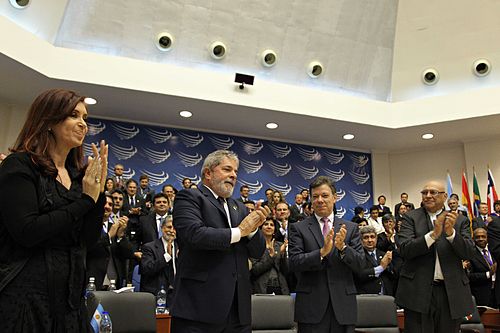| 2010 South American Summit | |
|---|---|
 | |
| Host country | Guyana |
| Date | November 26, 2010 |
The2010 South American summit (officially the 4th Ordinary Meeting of the Council of Heads of State and Government of the Union of South American Nations), took place inGeorgetown,Guyana on November 26, 2010. Eight heads of state and four foreign ministers of theUnion of South American Nations attended the summit. During the summit, the leaders signed an additional protocol to theConstitutive Treaty, adding a democratic clause to the charter of the organization.[1] The Georgetown summit ended with theEcuadorian president handing the UNASURpro-tempore presidency for the next twelve months to his Guyanese counterpart,Bharrat Jagdeo.[2]

Theheads of state andheads of government of eight countries participated.[3] The heads of state from Chile, Peru, Uruguay and Bolivia could not attend.[4]
The foreign ministers ofBolivia (David Choquehuanca),Chile (Alfredo Moreno),Peru (José Antonio García Belaúnde) andUruguay (Luis Almagro) represented their respective governments.[2]
Brazilian PresidentLuiz Inácio Lula da Silva advocated for the elimination of the asymmetries stopping the integration ofSouth America, in his speech during the summit. "None of our countries will really be prosperous, without all of us being also prosperous," said the Brazilian president.[5]
The name of the new secretary-general of the organization will remain unknown until the next presidential meeting inMar del Plata, Argentina.[6]
Guyana, which took over the Unasur rotating presidency from Ecuador, is one ofSouth America's poorest countries and for this reason, President Lula has already announced that Brazil will provide assistance for Georgetown's efforts in presiding over the regional bloc.[1]
The summit addressed theFalkland Islands sovereignty dispute between Argentina and the United Kingdom. Several articles of the final declaration state that all Unasur ports will be closed to vessels operating under the "illegal flag of Malvinas (Falkland Islands)".[7]
The leaders adopted an additional protocol to the organization's Constitutive Treaty, which added ademocratic clause to thecharter.[8] The democratic clause imposessanctions on any member country of UNASUR that breaks or attempts to breakconstitutional rule or thedemocratic system.[7] The clause establishes sanctions, such as shutting down borders and the suspension of trade, against the country that suffers an attempted coup. The decision to include a democratic clause was made after the recentupheaval in Ecuador that briefly threatened the administration of President,Rafael Correa.[9]
At the end of the summit, the heads of state and foreign ministers issued the "Georgetown Declaration". In the declaration, the leaders reiterated their commitment expressed in the “Declaration of Bariloche” of August 28, 2009, to strengthen South America as a zone of peace, upholding the decision to refrain from resorting to the threat or use of force against the territorial integrity of another UNASUR State.[10] The leaders expressed their willingness to continue working toward the consolidation of a common space for the political, economic, social, cultural, energy, environmental and infrastructure integration of the region, in order to achieve sustainable development.[11]